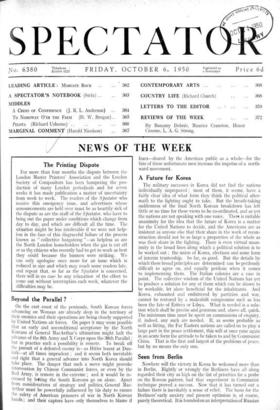Seen from Berlin
Nowhere will l the victory in Korea be welcomed more than in Berlin. Rightly or wrongly the Berliners have all along regarded their city as high on the list of priorities for a probe on the Korean pattern, had that experiment in Communist technique proved a success. Now that it has turned out a failure there is inevitably a sense of relief. The basis for the Berliners' early anxiety and present optimism is, of course, purely theoretical. It is founded on an interpretation of Russian motives, and interpreting Russian motives is a pastime that has as much in common with astrology as it has with politics. It is, for example, arguable that the best way to cover up the Korean failure would be to hot up the Berlin cauldron ; it is, again, possible to argue that the recent incidents in Berlin, like those in Austria and those others which were predicted for the week-end but which failed to materialise, are symptoms of diverted Russian interest in the West. But there is little profit in pursuing these speculations any distance. It is only profitable to add up the weapons which the Russians- still have in their armoury, in Berlin as elsewhere. The New York declarations have effectively guarded against an open attempt against the Western Zones of Berlin, made either directly by the Russians themselves or by the East German armed forces. This declaration has been underlined by the Allied guarantees specifically repeated last Sunday in Berlin itself. But it is worth remembering that there is still a great deal of material harm, and an almost infinite deal of irritation, that the Russians can provoke in West Berlin if they want to, without risk of war. The real danger is that the Russians are no more in ultimate control of circumstances than anyone else, and that an unlucky accident might sweep them, the Germans and the Allies out of their depths. It is for this reason that the Berliners will still have to keep their fingers crossed.



















 Previous page
Previous page